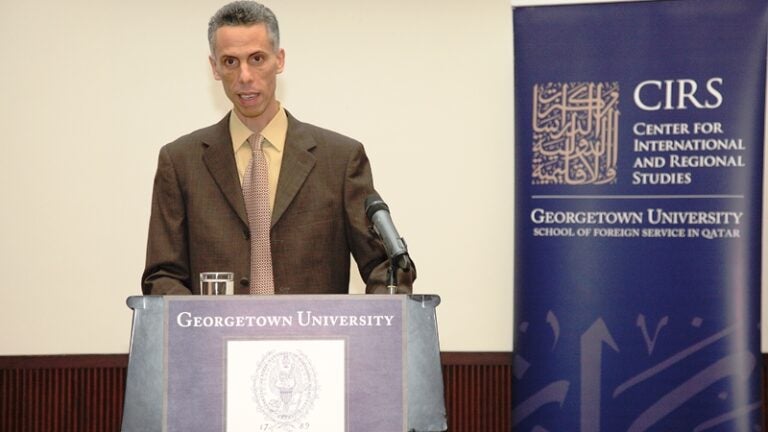CIRS Faculty Lectures, Dialogue Series, Race & Society, Regional Studies
Mohamed Zayani Lectures on Transnational Arab Media

Mohamed Zayani, Professor of Critical Theory at Georgetown University in Qatar, delivered a CIRS Monthly Dialogue lecture entitled “Transnational Arab Media, Regional Politics and State Security: Saudi Arabia between Tradition and Modernity” on February 1, 2011.
Offering “a social sciences perspective which places the development of media within a broad, historical, cultural and socio-political context,” Zayani delved into the intricacies of the Saudi media systems, exploring how the Kingdom of Saudi Arabia came to be an important media player. “Although lacking the historical depth which characterizes other prominent media traditions in the region,” Zayani noted, “the rise of Saudi media is remarkable.”
Within the span of a few decades, Zayani explained, “the Saudis managed to develop a decentralized media empire which encompasses a plethora of media conglomerates, transnational foreign-based networks, pan-Arab satellite channels, influential newspapers, and regional publications.” Prominent Saudi media ventures include pan-Arab newspapers like Al Hayat and Al Sharq Al Awsat and television networks like MBC, Orbit, ART and Rotana. Interestingly, most of these ventures, which are in private Saudi hands, tend to be entertainment oriented.
Driving the Saudi interest in media, Zayani noted, is “what maybe loosely described as a security imperative.” The Saudi interest in media goes back to the 1960s, when the kingdom found itself confronted with “a number of cultural and political challenges.” The development of Saudi media is tightly connected to “internal dynamics” which are social, cultural and political in nature, and “external dynamics” which are related to geopolitical considerations, and historical regional rivalries.
While designing a “circumscribed domestic media system” which protects its social values, limits the influence of Western culture, and enhances its national identity, Zayani noted, “Saudi Arabia invested in a transnational, foreign-based media system which helped safeguard its interests in the face of hostile regimes in the region, promote its foreign policy and exert regional political influence.” Contributing to the rise of Saudi media is oil wealth, the establishment of a regional infrastructure of satellite technology and the receding role of traditional media players in the region.
For Zayani what is interesting to note is “not only how and why Saudi Arabia came to be an important media player, but also what kind of contradictions, disjunctions, and unintended consequences the Saudi investment in media created, and to what effect.” According to Zayani, “the liberalization, expansion and deterritorialization of Saudi media brought about a number of challenges and conflictual dynamics which cannot be easily managed, let alone reconciled.” The most important disjunctions point to an uneasy relationship between tradition and modernity, between a protectionist drive and a liberalizing impetus, between national identity markers and market imperatives, and between depoliticization and repoliticization.
In a fast changing Middle East, these disjunctions are potentially consequential. For Zayani, “tremendous wealth, business imperatives, strategic allies, and political clout have positioned the Kingdom well and helped it play an important media role in the region. However, these assets are no longer sufficient to claim influence in an increasingly entangled and congested Arab mediascape”
Pointing to the rise of competing media ventures like the heavy weight Al Jazeera and the wide adoption of new and social media, Zayani concluded that “the unfolding of the political reality of the Middle East will be deeply intertwined with the reconfiguration of the media dynamics in the region.”
Mohamed Zayani’s works include Reading the Symptom (1999), Arab Satellite Television and Politics in the Middle East (2004), The Al Jazeera Phenomenon: Critical Perspectives on New Arab Media (2005) and The Culture of Al Jazeera: Inside an Arab Media Giant(2007).
Article by Suzi Mirgani, CIRS Publications Coordinator